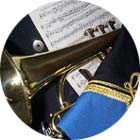|
Post Match Analysis:
Welsh Regional Championships 2002
First Section:
Brangwyn Hall, Swansea
Saturday 16th March
Adjudicator: Steve Sykes
Commences: After results of 2nd Section
Results:
1. Abergavenny Borough (D. Childs): 1 191
2. Thomas Coaches Mid Rhondda (A. Gibbs): 6 190
3. Tongwynlais Temperance (N. Seaman): 8 189
4. Rogerstone (C. Thomas): 9 188
5. Treherbert and District (G. Sheppard): 2 187
6. Pontardulais Town (C. Buckley): 10 186
7. Ammanford Town (C. Hogg): 11 185
8. Tylorstown Valley Lines (L. Phillips): 7 184
9. Deiniolen (J. Cant): 3 183
10. Markham and District (N. Seaman): 5 182
11. RAF St. Athans Vol (A. Bourne): 4 181
Top two qualify
Steve Sykes was an impressed man come the results of the First
Section, although for most people in the hall, they didn’t
quite agree with his decision.
His remarks to 4BR suggested that he had very clear ideas of what
he wanted to hear from the bands on George Lloyd’s “Royal
Parks” and he made it clear that the winning band were certainly
the most musically and technically consistent on a piece that has
many hidden qualities. Too many bands he said gave a fine first
or fine third movement, or a good second and great third, but for
him, only one band really made their mark on all three sections,
and that for him was Abergavenny Borough.
Drawn first, and with debutante conductor David Childs at the helm,
they certainly were the most consistent performer on the day and
there was some lovely playing in the quieter sections, but for most
people it lacked the vigour and brio of both the bands that came
second and third. The technical passages were overcome confidently
and it was noted that David Childs gave his band much more time
and space so that the more up tempo sections had a clarity rather
than just plain speed. It was controlled and pragmatic and certainly
caught the ear of the man in the box.
Thomas Coaches Mid Rhondda were second and gave a very confident
showing of the test piece that relied more on the technique rather
than the music to make its mark. It was noticeable quicker than
Abergavenny and as such lacked the clarity that was the hallmark
of their performance. It was certainly exciting and they produced
a big robust sound (at times a little too robust) but there was
much to merit it and it was obvious the band and its players could
confidently handle the piece. Second place was deserved.
Third placed Tongwynlais Temperance contributed to the main talking
point of the day though, as they gave a secure and detailed performance
that seemed to have won the contest for most people off the number
8 draw. It was certainly exciting, and the tempos were comfortably
handled by both the band and the conductor whilst there was some
super playing from the solo cornet and euphonium. They sounded the
biggest band on the day, but it was overall a rounded quality sound.
Perhaps it was the way in which they approached the quieter moments
in the music that led the adjudicator to mark them down, as some
of the playing was safe rather than really quiet, whilst the music
didn’t quite have the flow of Abergavenny in places.
Still, it was mighty impressive and the audience (and many rival
players) thought it was the winner, but it wasn’t to be and
they had to be content with third spot. Contesting can be a cruel
mistress at times
Below the top three came some solid performances, notably from Rogerstone
who came 4th and Treherbert who came 5th, whilst Pontardulais benefited
from a very musical approach to the music by Brian Buckley that
could have got them higher if they could have eradicated the slips.
All these bands fitted the bill in terms of what Steve Sykes spoke
of, as all of them gave a two thirds performance of quality.
The bottom four were Tylorstown Valley Lines, Deiniolen, Markham
and District and RAF St. Athans, who all gave solid and competent
accounts of themselves and the music, but all suffered solo problems
and each had one movement that was significantly weaker than the
rest. The odd thing was that it wasn’t the same movement that
caused the problems.
So a great debut for another member of the Childs family to start
his conducting career, and even if there were many out there who
did think perhaps there was a touch of 'beginners luck', the record
books will forever have him down as the conductor of the winning
band – that’s banding.
© 4BarsRest
 back
to top back
to top
|


|

